March 3, 2017 will mark one year since Honduran feminist and human rights defender Berta Cáceres was murdered.
In memory and celebration of Berta, we inquired what she meant, and still means, in the lives and activism of some of her compañeras. We asked them: What legacy has Berta's struggle, for women's rights and the defense of territory, left for your activism and commitment to social justice?
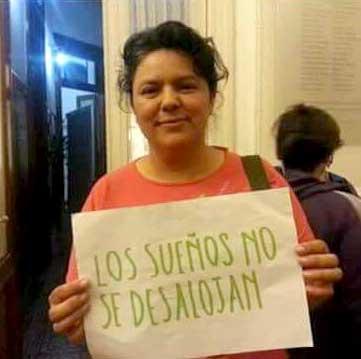
Berta Cáceres Flores was a Honduran feminist and woman human rights defender (WHRD), who dedicated her life to defending the Gualcarque River in Honduras from being destroyed by the hydroelectric megaprojects of corporations.
Despite being persecuted, threatened and criminalized, Berta was determined to continue her work through the organization she founded, COPINH (Council of Popular and Indigenous Organizations of Honduras).
On the 3rd of March 2016 the world woke up to the devastating news that Berta Cáceres had been murdered at her home in La Esperanza, Honduras. The human rights community and many across the world were outraged by her death.
One year after her murder, Berta’s case remains unclear and with impunity.
International pressure on the Honduran government resulted in an investigation.
Eight people have so far been arrested for Berta’s murder, including two employees of Desarrollos Energéticos SA (DESA - the Company behind the hydroelectric project in the Gualcarque River), and active and former military officers. Berta’s family and civil society organizations point out serious incongruences, from false accusations to repeated theft of Berta’s case file. In-depth research by Global Witness suggests powerful political interests and high-level corporate and military ties, far beyond the individuals arrested. The family continues calling on the government to allow and facilitate an investigation with independent international experts.
Since Berta’s murder, violence against human rights defenders (HRDs) has escalated to alarming levels.
Two other COPINH Members, Nelson García and Lesbia Janeth Urquía were also killed in March and July of 2016. Threats and security risks for activists defending land and territory are a daily reality in Honduras. The international community has taken actions and consistently demanded justice and an end to impunity. However, the Honduras Government has failed to act accordingly or provide an enabling environment for HRDs in the country.
Berta is among the many courageous women from Latin America, Africa, and Asia interviewed for the forthcoming AWID and WHRDIC publication on Women Human Rights Defenders Confronting Extractive Industries (expected in May 2017).
Her words, wisdom and passion persist in our ongoing work.
We pay tribute to Berta’s legacy and keep it alive in the voices of her family and colleagues.
Berta did not die - she multiplied!
Join in demanding Justice for Berta!
The National Network of WHRDs in Honduras is calling activists to gather in front of Honduran Embassies around the world, and to a global tweethaton on 2nd March to demand justice for Berta.
Bertha Zúñiga Cáceres
COPINH, Honduras
Hello, my name is Bertha Zúñiga Cáceres. I'm one of the daughters of Berta Cáceres and part of COPINH.
Greetings to all women defenders who are comrades in the defense of territories and bodies, especially to the Latin American ones, and a salutation to their struggles in any part of the world, of their territories.
Just days before the first year since the murder of my mother, our compañera in the struggle, Berta Cáceres, we want to think of it as her sowing, because she is a seed, multiplied in the rebel struggles of indigenous women, of the women and men who defend their rights to their territories.
I believe those principles materialize as a daily challenge, a big challenge to be taken up in every space, and I believe those principles are the richness and the potentiality in my mother's struggle. They also have to do with solidarity - practicing an authentic and deep solidarity with the struggles of other peoples, because in the end they are all part of one same struggle, that of all of us.
I believe we have to accept these struggles as our own. That comprehensive way of thinking opens a very wide road, where local struggles become truly universal struggles, which can be embraced from any part of the world.
I believe that having those principles always present, not as something that is said, but as something that is persistently practiced, also poses a great difficulty in every space, but most of all in the extremely repressive context we have in our country.
It has also been very useful, during this year, to ensure the sense of my mother's struggle not be lost; because her struggle is a collective struggle, which goes beyond one person or one single individual with almost impossible to match qualities. No. Is a struggle taken modestly and humbly over by a community, with the intention to listen to the realities faced by every person in every territory? The goal is not to carry on with only our own struggle; we need to always fight collectively and be clear enough to know that there will be no real triumph or liberation until we advance in an integral way toward that goal. Those are the things I believe constitute the legacy she has left to me, a very big legacy. Sometimes, it's not easy to put it in practice or to affirm it, but it is still very clear and it's very satisfying for all of our work.
I would also like to bring her memory back almost a year after, to demand justice. We are aware that thanks to her international work, we are a lot of people who have taken this commitment on as one of our own- a commitment to justice, to truth, to the guarantee that murders such as that of my mother will not take place again. We also take the opportunity to thank the deep solidarity seen in each rebel gesture and to make a call for this first anniversary to be translated not only into words but also in acts of denouncing, of mobilization, and in keeping on doing our work, which often times is plagued with difficulties- as it was my mother's work- plagued with harassment, criminalization and persecution. We also greet and encourage your work to give you strength and to let you know that we will remain here, standing up, being part of the struggles of all of you.
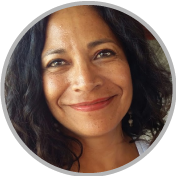
Ana María Hernández Cárdenas
In charge of self-care strategy of Iniciativa Mesoamericana de Defensoras [Mesoamerican Initiative for Women Human Rights Defenders] and of Casa La Serena [La Serena House], space for the care and healing of WHRD, México
Listen to Ana Maria's testimonial (in Spanish)
Your open and honest smile has been the first legacy to my life, dear Berta. It was in a Women Human Rights Defenders Gathering, in Guatemala, that I met you, just as a burst of light, while you were telling the ongoing struggles of the Lenca people, of the indigenous women defending their territories, their spirits living in the Gualcarque river, a sacred river for the communities and for all of your people.
They never defeated you in spite of their trying to annihilate the existence of the indigenous peoples.
I take your lessons of love for the rivers, which nurture and give sense to our struggles, like veins of our lands, guiding our ways. You made clear that neo-liberalism, racism and patriarchy are structural woes that we ought to get rid of, that we want peace, justice and good living. The echo of your life and your unjust death, both are part of my history and that of millions of women around the world who have you present, here, with us, dear Berta.
Claudia Korol
Popular educator and feminist activist, Pañuelos en Rebeldía [Rebel Scarves], Argentina
Walking with Berta Cáceres through all the corners of the Abya Yala, I learned that our feminist horizon needed to be able to combine the anti-patriarchal struggle with anti-capitalist and anti-colonial struggles.
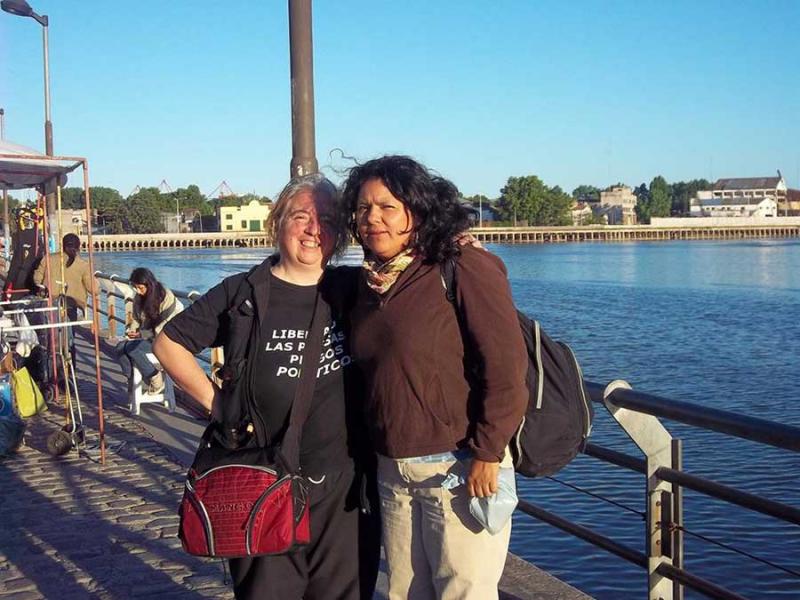
I also learned from Berta that we need to straightforwardly challenge corporations' interests as much as we confront gender based violence or dictatorships. Her deep analytical skills allowed her to look beyond circumstances, but she was convinced that acting to transform those circumstances was necessary. In the context of terror used by the Honduran powers to try to stop the struggles of the peoples, who in a thousand ways resisted the dictatorship and the ASO-sponsored governments arising from it, the tough and tender figure of Berta encouraged us, keeping saying time and again that 'they are afraid of us because we are not afraid'.
Berta believed in the people, in revolutions, in women's strength. She was a very free woman where her personal life was concerned. She loved, enjoyed life and that was not forgiven by the misogynists around her. She also had an absolute loyalty to the women who were her friends and to her comrades in the struggle. Whenever she could, she enjoyed nature, being among the trees, the river. She shared the Lenca people's spirituality, and from it she interwove herself with that of the Garífuna people. There she recovered energy and strength for each battle.
She got to know the secrets of the Gualcarque river, and made a life commitment to sewing her roots in the territory of Río Blanco, a territory she fought for until the very last of her days, when a killer’s bullet shot by a hitman sent by DESA corporation and by the government, tried to pull her out of this world.
Now, I don't have Berta everyday by my side to share joys and sorrows, dreams and projects, but I learned from her that it is possible to remain alive in many other ways: in one's children, in the compañerxs, in the Gualcarque river, in that small territory where her roots are still untouched, and in all of us who love her around the world.
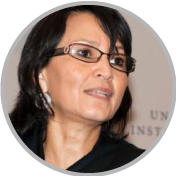
Gilda Rivera
Centro de Derechos de Mujeres [Center for the Rights of Women], Honduras
I met Berta Cáceres during the nineties. I was just coming back to the country and didn't know much about her or her struggle. However, since the first time I saw her, speaking with a mic in her hand, standing on a platform, I was strongly impressed by her inner strength, the clarity of her discourse, and her political messages defending the Lenca people.
Back then, I already considered myself a feminist but didn't identify her as one, and thought “it would be great to have such a fellow in the feminist ranks”.
Some months later, I met her again in a meeting as partners of a Norwegian organization which supported the work both of COPINH and of CDM… Miriam Miranda, from OFRANEH (The Black Fraternal Organization of Honduras), was also there and that was when I understood that both women were crucial not only in the struggle for indigenous and black people's rights, but also for women's rights and for the rights of all the Honduran peoples, and that Berta and Miriam had been able to frame their struggle in a global vision and commitment. Without saying it, they had taken the way towards feminism and they had politically clarity about the links among the various oppressions we suffer as women, as indigenous people, as black people, as impoverished people, etc.
Somehow, Berta's struggle made me understand that in our beloved Honduras, women's struggle is very connected to the struggle in the territories; Berta's legacy, and the legacy of many other women, allowed me to link our demands as feminists, our claims such as the right to live free from all forms of violence, sexual rights, reproductive rights, the right to political and civic participation in the defense and the struggle that women carry out in the territories, defending their commons.
For many social activists and advocates, Berta is an inspiring force. I was thinking of her yesterday and it was hard for me to acknowledge that she is not among us and with the Honduran people's struggles anymore. And I also thought that her contributions will remain and will go beyond time and all kinds of frontiers».
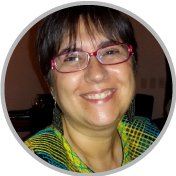
Carme Clavel Arcas
Regional Director of JASS Mesoamérica [JASS Central America], México
I knew about Berta from my friends who are part of the international solidarity and from my colleagues in Fondo Centroamericano de Mujeres (Central American Fund for Women), before I joined JASS. I saw her for the first time in a hotel in Managua in 2014, and I thought «this is the famous social activist Berta Cáceres». I was fascinated by the tone of her voice, by the presence she had, but above all by her ideas.
We met again in Tegucigalpa in June 2015, in one of many popular struggles, where she was always present. In August that same year, I had the chance to pay a visit to the Rio Blanco community where, with Berta and her community's leadership, COPINH had been defending the Gualcarque river. My colleagues from JASS and me went there to meet with the women, to learn about their struggles We went to the river, we swam in it, we laughed and enjoyed ourselves, with the women and their daughters and sons, in the pools of the river. From the stories told by the women, I understood COPINH and Berta's struggle to preserve the river and the communal lands.
By the end of August, 2015, I met with Berta once again, not knowing that, that would be the last time we saw each other. It was in a dialogue with women who were defenders of the land and the territory and against the mining corporations in Nicaragua.
Thank you Berta for your ideas, your commitment, your knowledge, for the organizational work you developed, for your family. As we said in your farewell in March 2016 at Intibucá: «Berta didn't die, she was multiplied». And that is true, you are still alive in your daughters and son, in your comrades of COPINH and of other popular and indigenous Honduran organizations, in the women who are part of the feminist and women's movements. Thank you, Berta, for giving us that voice.
We keep demanding justice for your murder.
* GDC and VV would like to acknowledge the contribution of Inna Michaeli
2224x1253.jpg)